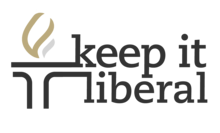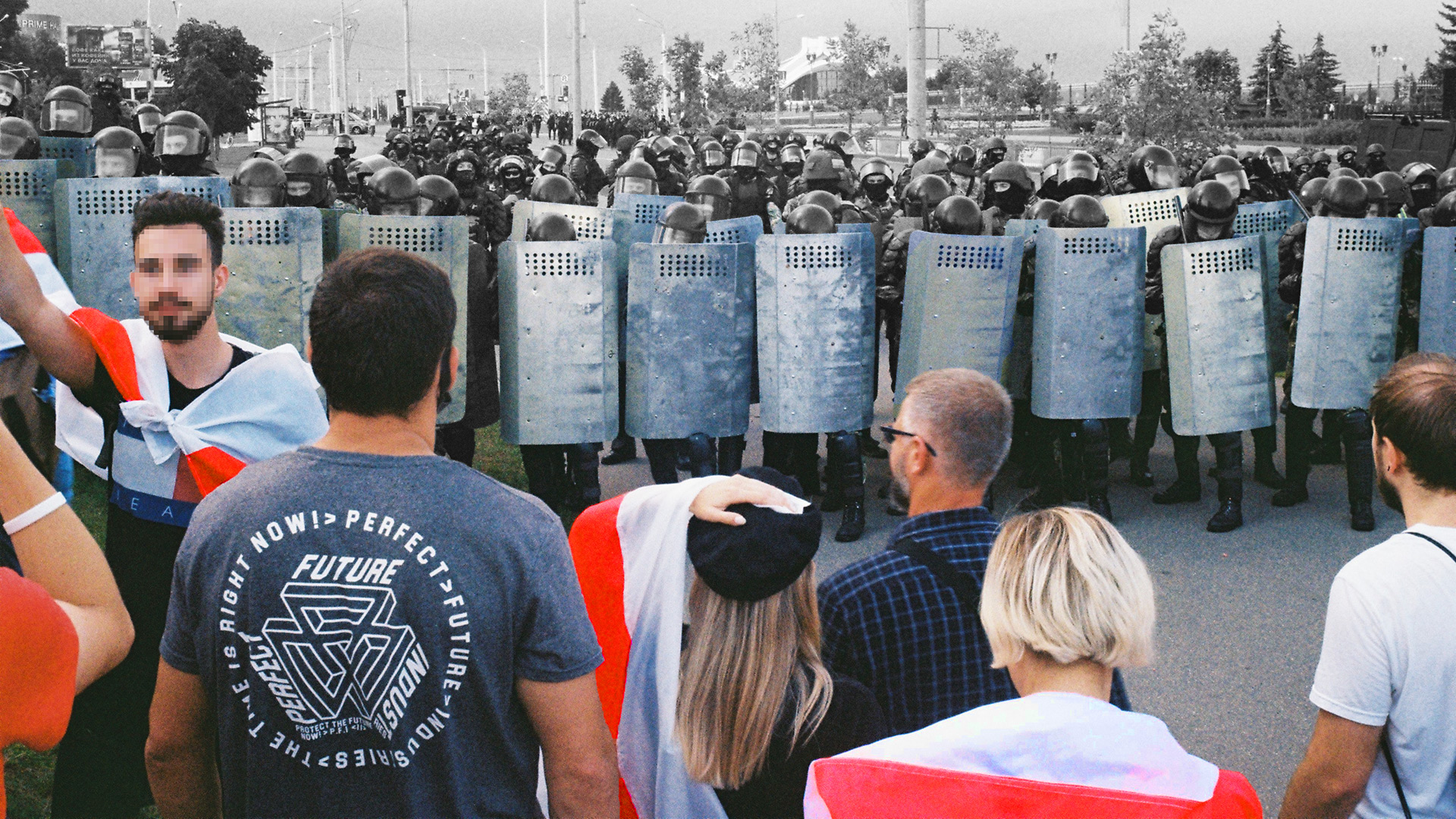The night of August 9th to 10th, 2020 was certainly one of the most moving, but also most frightening moments of the past year. In Minsk, around a hundred thousand people protested against dictatorship, repression and electoral fraud, for democracy and human rights. Police and military intervened harshly, peaceful protestors were attacked with batons, stun grenades and rubber bullets. Thousands of arrests, torture, hundreds of seriously injured people. One demonstrator shot dead by police despite raising his hands. Those were the result of these first two days of protest.
One thing must be kept in mind: The events seem far away. Yet Minsk is just 1,100 kilometers away from Berlin – that is about half the distance to Mallorca or just as far as Paris. So, the events described are not taking place somewhere in the Far East or South America, but right on our doorstep.
Europe’s last Dictatorship
The Republic of Belarus is known as “Europe’s last dictatorship”. President Alyaksandr Lukashenka has ruled the country since 1994. Formally, he was elected democratically, thanks to election manipulation. The fact that he is still legally allowed to be in office at all is due to a highly questionable constitutional amendment which was added in 2006. Since then, well-founded accusations of manipulation have been raised in every presidential election. Given the broad resistance among the population, no one can seriously believe in alleged landslide victories like the one in August 2020, which Lukashenka – officially – won with 80.08 percent of the vote’s cast.
Belarus is the only country in Europe which still has not forfeited the death penalty. Mysterious disappearances of opposition figures are commonplace. Press and broadcasting stations are 95 % state-owned, and critical journalists must expect serious reprisals. Lukashenka makes no secret of his homophobia, LGBTQ* organizations and activists are discriminated by the state, parades are banned, access to international online portals is restricted. Torture and violence in the state’s treatment of detainees are part of everyday life in Belarus. The secret service still bears the tasteful Soviet name KGB (English: “Committee for State Security”).
Under Lukashenka, the Soviet Union’s economic philosophy lives on – a planned economy. The central bank reports directly to the president. Many companies are still state-owned. Private entities are massively restricted or directly controlled by the state. Corruption is commonplace. The fact that this system has not yet collapsed can be explained by Belarus’ relations to Russia. But even those are often questioned due to disputes in the energy sector.
The list of further countries which Belarus maintains good relations to is a best of authoritarianism and general defiance of freedom: In addition to North Korea, Syria and Iran, the People’s Republic of China, Venezuela, and Cuba also make the list. Lukashenka is a dictator – any other term would be euphemistic, glorifying even. The last dictator in Europe.
Lonesome
Yes, Belarus is part of Europe. Of course it is. Although the country is the only one besides Vatican1 and Kosovo2 which is not a member of the Council of Europe and thus – even unlike Russia(!) – denies its citizens access to the European Court of Human Rights. The Belarusian opposition is campaigning for a membership in the Council of Europe, while the government intends to receive a special guest status. Lukashenka apparently hoping for economic advantages without having to adhere to the European Convention on Human Rights.
Belarus is considered by the Russian Federation as a buffer zone between the NATO countries and Russian territory. It is unsurprising that Russian troops were spotted making their way to Belarus during 2020 uprisings. Even before the election, 33 Russian mercenaries were arrested in Minsk – Lukashenka feared similar plans by Putin as in the international law-violating annexation of Crimea. Since then, at the latest, the country has been isolated from the rest of Europe.
Considering recent history, this situation is by no means a matter of course. At least until 2011, German police officers trained Belarusian security forces. Security forces of the dictator Lukashenka. Security forces who may be shooting at demonstrators today. Security forces who may be arresting opposition members and journalists today. Yes, this is speculation – and yet, from today’s perspective, a monstrosity.
In recent years, the EU has increasingly lost sight of Belarus. Prior to the 2015 presidential election, sanctions against President Lukashenka were lifted. The situation in Belarus took a back seat, while issues such as the refugee crisis dominated daily business. An event akin to the evening of August 9th, 2020, was necessary to put Belarus back into the spotlight.
2020 – Shock or Opportunity?
The 2020 presidential election took place under different circumstances than the previous ones: Five of Lukashenka’s most promising opponents were not admitted taking part in the election or were even arrested. As a result, Swjatlana Zikhanouskaya, the wife of the imprisoned candidate Zyarhey Zikhanousky, who had not yet appeared on the political stage, announced her candidacy for president. The wives of other imprisoned candidates supported her, although the Belarusian opposition had previously been strongly divided. Zikhanouskaya’s campaign events were very popular. A spirit of optimism spread.
An election in Belarus is not an election in a free democracy. After being threatened with reprisals, Zichanouskaya decided to send her family into exile. After the polling stations opened, election observers noted countless violations of essential principles of democratic elections. Ultimately, the inevitable happened: Lukashenka declared himself the winner with allegedly 80.08 percent of the vote. Zikhanouskaya, for her part, saw herself as the winner of the election – her Twitter profile, created shortly after the election, is bearing the title “Leader of democratic Belarus.
Rarely have hope and terror been so close together in Belarus as in the evening of August 9, 2020. All over the country, people took to the streets – about a hundred thousand just in Minsk. Lukashenka initiated drastic measures enforced by police and military. The Internet was also restricted in order to sabotage further organization of the protests. VPNs, YouTube, and various other channels were blocked. Information could only be obtained from Telegram channels such as NEXTA Live or from the few foreign correspondents who were still able to continue their work, still scores of journalists were arrested. Infrastructure was also shut down, Minsk metro traffic was suspended, streetlights were switched off.
But the protests did not stop. They have not yet. Lukashenka was booed on his victory tour of the industrial enterprises. A general strike was organized in state-owned enterprises. In some cases, state media was unable to broadcast due to a lack of personnel. Meanwhile, people continued to take to the streets. Peacefully. Some police officers and soldiers even switched sides. Special attention was paid to Belarusian women, who protested against the Lukashenka regime with human chains and bouquets of flowers in their hands.
The white-red-white flag became the symbol of the protests. It was first used by the Belarusian independence movement in 1917. After the communist revolution it was only flown by the government-in-exile in Poland. It enjoyed a brief revival from 1991 after the breakup of the Soviet Union. 1995, a year after Lukashenka was elected president, he had it replaced by the flag of the former Belarusian Soviet Socialist Republic, just abandoning hammer and sickle. Since then, white-red-white has been the symbol of the democratic opposition. It would be hard to break down the conflict any better: The Soviet nostalgist Lukashenka versus the tradition of the first republic on Belarusian soil.
A President-in-Exile
Svyatlana Zikhanouskaya became the democratic opposition’s identification figure before and also after the election – even in exile. In the evening of the day after the election, a tweet by Linas Linkevičius, the foreign minister of Belarus’ neighboring country Lithuania, caused concern. He had been unable to reach the Belarusian presidential candidate for hours. Not even her staff knew her whereabouts.
Fortunately, Linkevičius was able to clear the air the next morning. Zikhanouskaya had entered Lithuania. The circumstances of her departure from Belarus were unclear. While her campaign team announced that Zikhanouskaya had been brought to Lithuania by the Belarusian authorities, she herself stated that she had left voluntarily – possibly under pressure from the authorities.
Today, Zikhanouskaya supports the protests in the country from exile. She considers herself the legitimate, democratically elected president of Belarus. She continues to call on Belarusians to peacefully protest against Lukashenka and organizes actions such as the Day of Solidarity with Belarus on February 7th, 2021. She meets politicians, networks, and advocates for Europe to put more pressure on Lukashenka’s regime. An important commitment, because Europe must act.
Brussels & Berlin?
Lukashenka’s “election victory” sparked joy in certain states – Beijing, Moscow, Caracas, Istanbul, and Damascus congratulated promptly. Significant. And another sign that Europe had to act. The EU was sluggish to react, but it did – sanctions were driven forth on August 14th, 2020. Followed by the rejection of the election results on August 19th. It took until October to reach a final agreement on sanctions. Furthermore, Lukashenka personally was initially exempted until November for diplomatic reasons. Nevertheless, opposition figures are continuingly imprisoned today due to their commitment to human rights and democracy.
The fact that the EU’s sanctions were ever suspended at all is absurd. At the time, it was assumed that the human rights situation in Belarus was to improve. A catastrophic miscalculation, exemplified by the crackdown on demonstrators and journalists. After the 2015 presidential election, OSCE election observers stated that Belarus still had a long way to go to establish democratic elections.3 It is also hardly surprising that Belarus ranks 153rd out of 180 in the 2020 freedom of the press rankings.
In Germany and the rest of Europe, everyday life has returned. The situation in Belarus was exciting and frightening and the protests were headline-dominating for a few days. As of today, the situation in the country is nothing but a footnote of foreign affairs. The EU rather prefers to conclude an investment agreement with the People’s Republic of China. Otherwise, there is little sign of a common foreign and security policy.
Two flying hours
Meanwhile, Lukashenka is committing his crimes on our doorstep, right in front of our eyes, less than two flying hours from Berlin. The draft of a European and German Magnitsky Act4 is controversial and the progress. Yet it is time to finally act. Germany and Europe must repeatedly and unequivocally stand against the Belarusian regime and behind the demonstrators. Sanctions must be extended, and international investigations of all crimes against journalists and opposition members must be initiated.
Lukashenka must feel the liberal breath of the West breathing down his neck. So close that exile looks even more welcoming than power. So close that the people of Belarus finally get the free elections and human rights they deserve. Freedom is not only a domestic concern, but a global one.
About the author
Nils mainly focuses on day-to-day politics, human rights considering domestic and foreign issues, and legal policy. He is a 21-year-old law student from North Rhine-Westphalia, Germany. Nils is a member of German Free Democratic Party and their youth organization.
- The Vatican’s foreign policy representation lies with the Holy See, which in turn cannot become a member of international organizations.[↩]
- Kosovo’s status under international law is disputed. However, there is observer status at the Council of Europe through representatives of the Kosovar parliament.[↩]
- Organization for Security and Cooperation in Europe, Statement of Preliminary Findings and Conclusions on the Belarus Presidential Elections 2015, p. 1.[↩]
- Sanctions law against those responsible for human rights violations based on U.S. model, see https://en.wikipedia.org/wiki/Magnitsky_Act.[↩]

